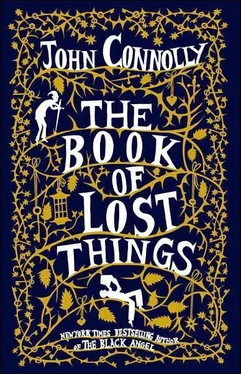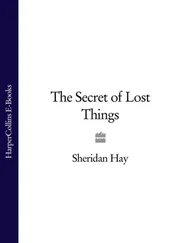John Connolly
The Book Of Lost Things
This book is dedicated to an adult, Jennifer Ridyard,
and to Cameron and Alistair Ridyard, who will be
adults all too soon.
For in every adult dwells the child that was, and in
every child lies the adult that will be.
Deeper meaning resides in the fairy tales
told to me in my childhood than in the
truth that is taught by life.
—FRIEDRICH SCHILLER (1759–1805)
Everything you can imagine is real.
—PABLO PICASSO (1881–1973)
I. Of All That Was Found and All That Was Lost
ONCE UPON A TIME—for that is how all stories should begin—there was a boy who lost his mother.
He had, in truth, been losing her for a very long time.
The disease that was killing her was a creeping, cowardly thing, a sickness that ate away at her from the inside, slowly consuming the light within, so that her eyes grew a little less bright with each passing day, and her skin a little more pale.
And as she was stolen away from him, piece by piece, the boy became more and more afraid of finally losing her entirely. He wanted her to stay. He had no brothers and no sisters, and while he loved his father, it would be true to say that he loved his mother more. He could not bear to think of a life without her.
The boy, whose name was David, did everything that he could to keep his mother alive. He prayed. He tried to be good, so that she would not be punished for his mistakes. He padded around the house as quietly as he was able, and kept his voice down when he was playing war games with his toy soldiers. He created a routine, and he tried to keep to that routine as closely as possible, because he believed in part that his mother’s fate was linked to the actions he performed. He would always get out of bed by putting his left foot on the floor first, then his right. He always counted up to twenty when he was brushing his teeth, and he always stopped when the count was completed. He always touched the faucets in the bathroom and the handles of the doors a certain number of times: odd numbers were bad, but even numbers were fine, with two, four, and eight being particularly favorable, although he didn’t care for six because six was twice three and three was the second part of thirteen, and thirteen was very bad indeed.
If he bumped his head against something, he would bump it a second time to keep the numbers even, and sometimes he would have to do it again and again because his head seemed to bounce against the wall, ruining his count, or his hair glanced against it when he didn’t want it to, until his skull ached from the effort and he felt giddy and sick. For an entire year, during the worst of his mother’s illness, he carried the same items from his bedroom to the kitchen first thing in the morning, and then back again last thing at night: a small copy of Grimm’s selected fairy tales and a dog-eared Magnet comic, the book to be placed perfectly in the center of the comic, and both to be laid with their edges lined up against the corner of the rug on his bedroom floor at night or on the seat of his favorite kitchen chair in the morning. In these ways, David made his contribution to his mother’s survival.
After school each day, he would sit by her bedside, sometimes talking with her if she was feeling strong enough, but at other times merely watching her sleep, counting every labored, wheezing breath that emerged, willing her to remain with him. Often he would bring a book with him to read, and if his mother was awake and her head did not hurt too much, she would ask him to read aloud to her. She had books of her own—romances and mysteries and thick, black-garbed novels with tiny letters—but she preferred him to read to her much older stories: myths and legends and fairy tales, stories of castles and quests and dangerous, talking animals. David did not object. Although, at twelve, he was no longer quite a child, he retained an affection for these tales, and the fact that it pleased his mother to hear such stories told by him only added to his love for them.
Before she became ill, David’s mother would often tell him that stories were alive. They weren’t alive in the way that people were alive, or even dogs or cats. People were alive whether you chose to notice them or not, while dogs tended to make you notice them if they decided that you weren’t paying them enough attention. Cats, meanwhile, were very good at pretending people didn’t exist at all when it suited them, but that was another matter entirely.
Stories were different, though: they came alive in the telling. Without a human voice to read them aloud, or a pair of wide eyes following them by flashlight beneath a blanket, they had no real existence in our world. They were like seeds in the beak of a bird, waiting to fall to earth, or the notes of a song laid out on a sheet, yearning for an instrument to bring their music into being. They lay dormant, hoping for the chance to emerge. Once someone started to read them, they could begin to change. They could take root in the imagination, and transform the reader. Stories wanted to be read, David’s mother would whisper. They needed it. It was the reason they forced themselves from their world into ours. They wanted us to give them life.
These were the things that his mother told David, before the illness took her. She would often have a book in her hand as she spoke, and she would run her fingertips lovingly across the cover, just as she would sometimes touch them to David’s face, or to his father’s, when he said or did something that reminded her of how much she cared for him. The sound of his mother’s voice was like a song to David, one that was constantly revealing new improvisations or previously unheard subtleties. As he grew older, and music became more important to him (although never quite as important as books), he thought of his mother’s voice less as a song and more as a kind of symphony, capable of infinite variations on familiar themes and melodies that changed according to her moods and whims.
As the years went by, the reading of a book became a more solitary experience for David, until his mother’s illness returned them both to his early childhood but with the roles reversed. Nevertheless, before she grew sick, he would often step quietly into the room in which his mother was reading, acknowledging her with a smile (always returned) before taking a seat close by and immersing himself in his own book so that, although both were lost in their own individual worlds, they shared the same space and time. And David could tell, by looking at her face as she read, whether or not the story contained in the book was living inside her, and she in it, and he would recall again all that she had told him about stories and tales and the power that they wield over us, and that we in turn wield over them.
David would always remember the day his mother died. He was in school, learning—or not learning—how to scan a poem, his mind filled with dactyls and pentameters, the names like those of strange dinosaurs inhabiting a lost prehistoric landscape. The headmaster opened the classroom door and approached the English master, Mr. Benjamin (or Big Ben, as he was known to his pupils, because of his size and his habit of withdrawing his old pocket watch from the folds of his waistcoat and announcing, in deep, mournful tones, the slow passage of time to his unruly students). The headmaster whispered something to Mr. Benjamin, and Mr. Benjamin nodded solemnly. When he turned around to face the class, his eyes found David’s, and his voice was softer than usual when he spoke. He called David’s name and told him that he was excused, and that he should pack his bag and follow the headmaster. David knew then what had happened. He knew before the headmaster brought him to the school nurse’s office. He knew before the nurse appeared, a cup of tea in her hand for the boy to drink. He knew before the headmaster stood over him, still stern in aspect but clearly trying to be gentle with the bereaved boy. He knew before the cup touched his lips and the words were spoken and the tea burned his mouth, reminding him that he was still alive while his mother was now lost to him.
Читать дальше












